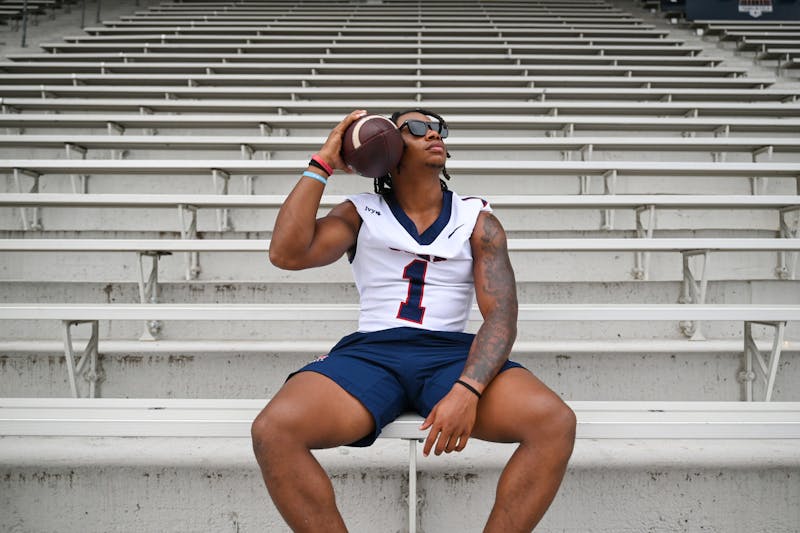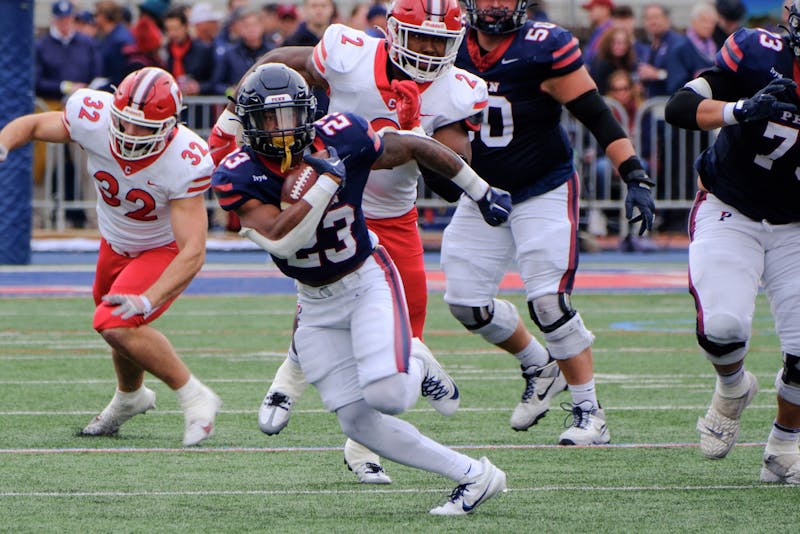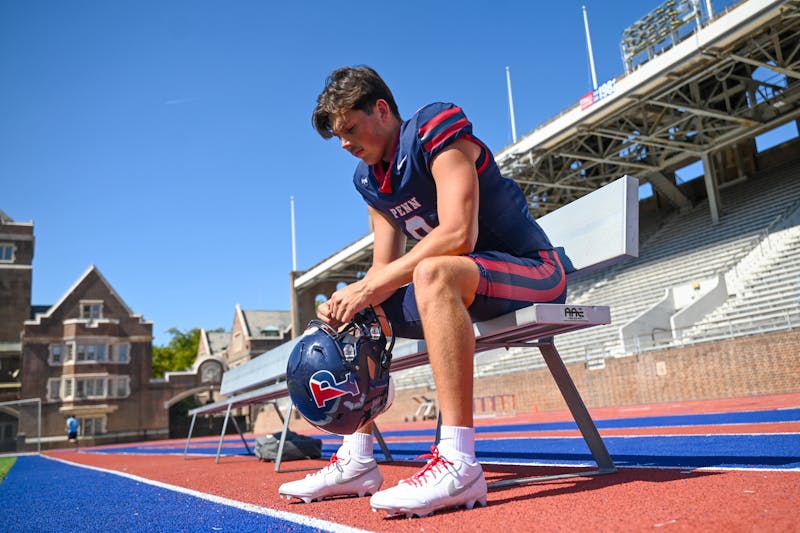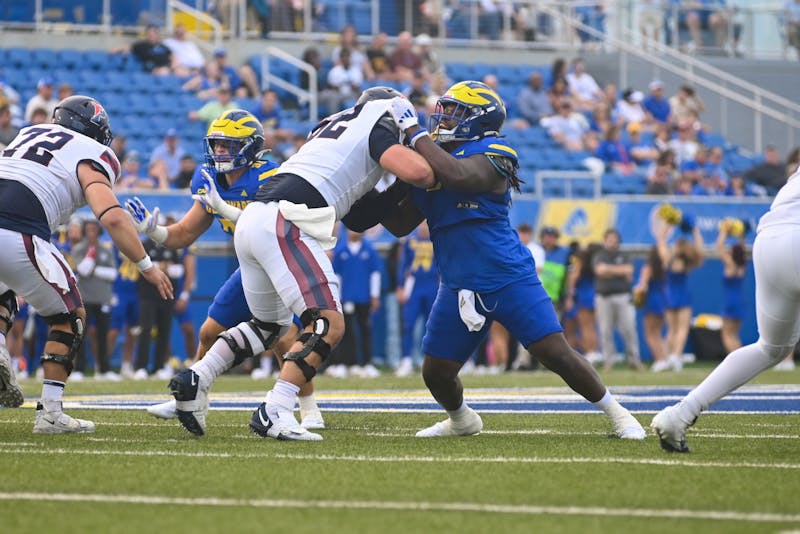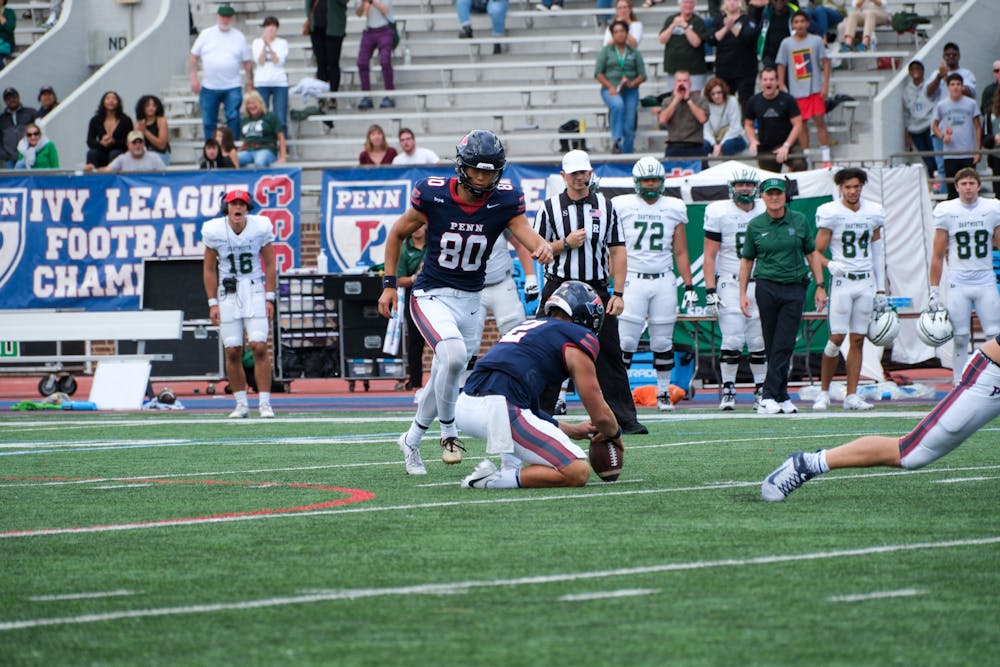
Now-senior kicker Albert Jang attempts a field goal against Dartmouth on Sept. 30, 2023.
Credit: Abhiram JuvvadiThe brown leather football spins two and half rotations, perfectly down the line to the holder. The holder catches the ball and brings it down vertically, ensuring it leans just a little forward and sideways. The kicker looks up at the goal post one last time before rushing forward, leaning his body as he prepares to kick, and strikes the football with the top of his foot.
Snap, hold, kick. All under 1.3 seconds.
It’s not every day that getting on the wrong bus changes the trajectory of your life.
But it did for Penn football senior kicker Albert Jang. One day as a high school freshman in Suwanee, Ga., he accidentally got on the wrong village school bus — the football bus instead of the soccer one. “I didn’t want to say that I was on the wrong bus,” Jang said. “So I got off the bus and said I was the kicker. And that was that.”
Jang would soon find out that kicking a soccer ball is different from kicking a football, as would junior Santiago Sturla. Sturla grew up in Argentina, where Lionel Messi's reputation reigned supreme, but later moved to Blue Bell, Pa., where he joined the youth football organization.
“When it came time to kick the [football], the coaches were always like, ‘Hey Santi, you play soccer. Go ahead and do it,’” Sturla said.
Both Jang and Sturla’s soccer backgrounds shaped them into the elite kickers they are today. They learned to change their kicking techniques to fit that of a prolate spheroid football, instead of a spherical soccer ball. They now kick far less frequently in football than they used to in soccer. With fewer chances to go on the field, they have learned to value “quality over quantity.”
“A lot of the times we're stepping on the field, the game is on the line,” Sturla said. “It could be the last few seconds of the game. You need to make that kick.”
To the casual observer, it would seem easy to kick a football in between goalposts 18 feet and six inches wide. But when it comes to getting the right height and the right angle, “it has to be perfect,” Jang said.
“If the hold is an inch off the mark, then you know that kick will go right … so that just comes down to getting reps with your guys and building that trust [with] one another.”
But getting “reps” in doesn’t mean kicking a thousand balls a day, nonstop. It means concentrated, deliberate, quality-over-quantity practice, enough to perfect your form without tiring out your leg.
"You're locked in every single time," Sturla said of his practice attempts. “I would say, visual reps are just as important, and understanding … the mental aspect of this skillset, which is arguably just as important as the physical aspect of it, being able to control your nerves, but also understand your role and execute on that every time you step on the field.”
While also perfecting their kicks, repetitions build trust with the snapper and holder. By the time the snapper throws the ball, the kicker is already running, trusting that the holder will catch the ball and position it at the right spot, at the right angle, at the right time. If there’s any hesitation by any of the athletes, even for a half second, it throws off the whole 1.3-second operation.
That teamwork and trust is what motivates the team. Not many Penn students come to watch football games, and the players don’t need their praise or recognition.
“We kind of play for each other, and we’re playing for something bigger than ourselves … and I feel like that’s something that I think is truly special,” Sturla said.
Both players think of the people who have helped them along the way: for Jang, his parents who immigrated from Korea and sacrificed so much for him; for Sturla, his teammates who motivate him to be and play at his best.
Just as there was a change from soccer to football, there was also a change from high school football to Division I football. Jang noted how the “stakes are higher” in college, and Sturla pointed out that it was more “competitive.”
But at the end of the day, they both agreed that “kicking is kicking.” It’s the same ball, the same field. The same pressure and exhilaration of coming out on the field with a game's worth of effort riding on you.
“I get to sometimes be the exclamation mark at the end of a sentence for the team," Jang said.
The Daily Pennsylvanian is an independent, student-run newspaper. Please consider making a donation to support the coverage that shapes the University. Your generosity ensures a future of strong journalism at Penn.
Donate







